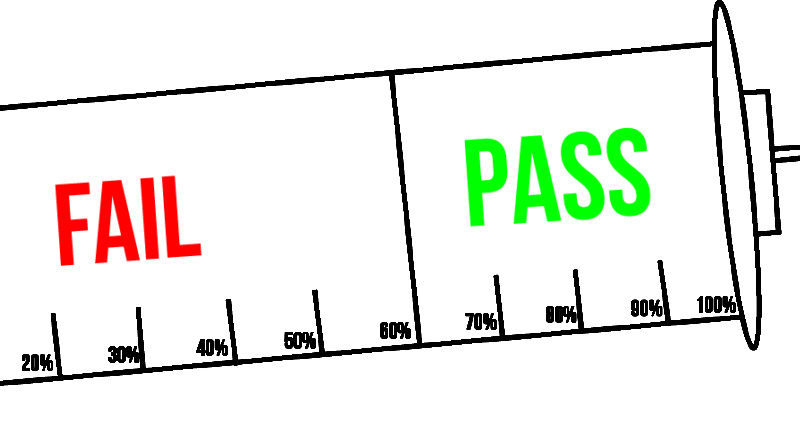District implements pass or fail grading system
GRAPHIC: For the spring semester of 2020, the Davis Joint Unified School District has implemented a pass or no pass grading system.
By Talullah Manghise,
BlueDevilHUB.com Staff–
In an email sent to parents on April 10, Davis Joint Unified School District Superintendent John Bowes declared that the district would be utilizing a pass or no pass grading system for the current semester.
This new grading system was implemented to prevent putting students without consistent access to technology at a disadvantage.
“Given the broad variability of home conditions for many of our students and new approach to remote instruction, a pass/no pass grading system for the remainder of the spring semester is the most equitable option for our students,” Bowes stated in the aforementioned email.
Cindy Pickett, president of the DJUSD Board of Education, believes that since teaching methods and material have changed to adjust to distance learning, standard methods of student evaluation had to be rethought as well.
“Our spring semester pass/no pass grading approach is based on our closely held value of equity and a practical understanding of the instructional shifts that we are asking our staff to make. A spring semester pass/no pass in this transition to digital learning means staff have the space and time to adapt and meet student needs and can account for the inequitable learning conditions that the COVID-19 crisis has exacerbated across our district,” Pickett said.
To adjust to the new pass or fail grading system, some teachers, like Davis High physics teacher Jean-Paul Whittall, have altered their assignment types and scoring methods.
In the past, Whittall’s assignments had objective right and wrong answers, but to accommodate the current educational situation, he’s been giving partial answer credit and making corrections to student work to give them the opportunity to improve.
“The idea is that this can be repeated until any assignment is perfect. This takes a lot of time and there are not enough hours in the day to do this while teaching a full six hour [class] every day, but now there is opportunity to implement this more fluid system,” Whittall said.
Whittall believes another benefit of the pass fail system is that students who perform well due to cheating are not given overly high marks.
“There is literally no way that I can know for certain that students aren’t on phones or the internet getting answers from elsewhere. The best we can do at this point as teachers is indicate whether or not someone seems to have sufficiently progressed through the material, but a distinction between an A, B or C is impossible without assurance that students’ work is truly theirs and theirs alone,” Whittall said.
Senior Maya Aram believes that the switch to pass and fail grading will help reduce student stress and will accommodate students with less resources.
“Since online school is a completely new experience for everyone, it’s going to be hard for some people to access online tools or adjust to the new system,” Aram said. “It puts less pressure on us and that’s good considering everything that’s going on right now.”
According to Pickett, the school board wanted to take into account the stress, anxiety and insecurity being inflicted on students and their families during this pandemic.
“Students’ social-emotional well-being is a priority for the school district. By implementing the pass/fail grading system, the district is acknowledging the tremendous impact of this pandemic and the likelihood of it impairing students’ grades,” Pickett said.
According to Pickett, support of this system from teaching staff has been strong. However, she noted mixed reactions from students and parents due to its potential effects on future college admissions.
“The main consequence of this system is that pass/fail grades are not calculated into students’ GPA for admission to many universities such as those in the University of California system. What this means is that the pass/fail grades can neither help nor harm students’ GPA,” Pickett said.
Other well-ranked school districts in the nation, like Palo Alto, and universities such as UC Berkeley have transitioned to pass or fail grading systems.
In his email on April 10, Bowes assured parents that “moving to this system will benefit our staff and students without negative consequences for students with collegiate aspirations,” and that “universities across the nation […] have made it clear that students will not be penalized for missing traditional standardized tests or for posting pass/no pass transcripts for this semester.”
The Board of Education will discuss how to overcome the potential downsides of the new grading system at their next meeting on May 7.
All DJUSD schools will transition back to typical letter grading for the 2020-21 school year.




